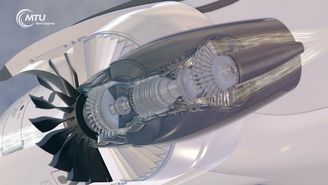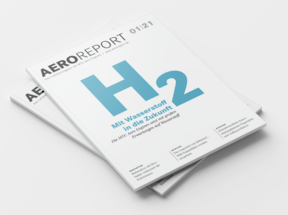Corporate strategy
MTU's corporate strategy is geared to profitable growth and customer satisfaction.
The four target areas of MTU's growth strategy are:
A balanced product portfolio – Participation in rapidly growing new programs
MTU focuses on rapidly growing and high-volume military and commercial engines and works with various partners. It optimizes its risk profile and growth opportunities through continuous participation in varying thrust classes and fields of application. MTU Aero Engines is currently focusing on ramping up production of Geared Turbofan™ engines for regional and medium-haul jets, which it has developed together with partners, where the ramp-up has been delayed by the Covid crisis. At the same time, it is concentrating on the ongoing development of this engine as the Pratt & Whitney GTF Advantage™ and on developing General Electric’s GE9X engine program for the Boeing 777X widebody aircraft. There will also be a cargo version of the aircraft. MTU’s excellent positioning in the MRO segment is partly due to these programs, as the company has secured itself a share of the future aftermarket service business through its stakes in these engine programs.
In the commercial maintenance business, the company is driving forward the expansion of its portfolio of products and services, including digital services, to enhance customer satisfaction and continuously broaden its customer base.
In the military business, the discussions about future procurement programs have become more concrete at both national and European level. Germany, France and Spain are planning to introduce the new Future Combat Air System (FCAS) from 2040. A key element of this system is a new fighter plane. MTU aims to develop the engine for this plane jointly with Safran Aircraft Engines, Paris, France and ITP Aero, Zamudio, Spain.
Cutting-edge technologies – Maintaining and expanding technological leadership
MTU is currently extending its technological leadership by focusing on the ongoing development of gas turbines for aircraft, for example, using new materials and modern manufacturing technologies such as additive processes. In combination with optimized cyclic processes, the aim for the mid term is to raise the efficiency of MTU’s core modules – the low-pressure turbine, high-pressure compressor and turbine center frame – and reduce their weight, in order to increase profitability and environmental friendliness.
The aim of reducing the climate impact of aviation set out in the Paris Agreement is far more ambitious than the previous declarations of intent by the aviation sector, for example, in Flightpath 2050. Consequently, MTU has revised its Claire (Clean Air Engine) technology agenda. The declared aim is to bring onto the market products that enable climate-neutral or emission-free flying well before 2050. In its “Technology Roadmap Towards Emission Free Flying,” MTU describes specific propulsion concepts as pilot concepts. The WET engine, a revolutionary gas turbine-based propulsion system as a logical advancement of the GTF, can significantly reduce all climate-related emissions. In addition, MTU is working on an almost completely emission-free concept, the flying fuel cell, which is an electric propulsion system based on hydrogen-powered fuel cells. The aim is to demonstrate both concepts as part of the national aviation research program and, in a European context, through Clean Aviation.
In addition to alternative propulsion systems, on the road to climate-neutral aviation, sustainable aviation fuels (SAFs) play an important role. They have the potential to significantly reduce the climate impact of aviation with the engines currently used in aircraft. MTU is therefore playing a part in this field, for example, as a founding member of the association aireg (Aviation Initiative for Renewable Energy in Germany e.V.) and as a strategic partner in several projects to set up SAF production facilities.
Alongside technical improvements to products, the digitalization of products, services and value-creation processes is growing in importance. Here, MTU’s activities are geared primarily to reducing lead times and expenses, for example in development by making extensive use of simulation techniques in all disciplines through to full integration in the virtual engine.
Enhanced competitiveness – Increased productivity accompanied by a reduction in capital tie-up
MTU encourages a culture of continuous improvement in order to secure its competitiveness and further increase customer satisfaction. The focus here is on optimizing structures, processes and capital tie-up in all areas of the company. Digitalization and automation technologies (Industry 4.0) play a key role here.
The goal is to continuously optimize MTU’s supply chain and its production and service network in terms of delivery capability, quality and costs. Profitability and competitiveness are to be enhanced further by high investment in maintenance and repair shops in countries where wage costs are low.
A massive drive is underway to secure customer satisfaction through continuous adjustment of the product portfolio between service locations and the resulting flexibility.
Alongside measures to improve productivity and customer satisfaction, in the future MTU will be stepping up its focus on reducing CO2 emissions in production. The ecoRoadmap initiative at the Munich site will therefore be rolled out to other production locations over time.
MTU regards responsible economic activity as an important criterion in its competitiveness, and acts in harmony with its sustainability strategy.
Innovative corporate culture – Motivated employees in a creative environment
Highly motivated, skilled workers are crucial to the successful development of the MTU Group. MTU’s corporate culture places emphasis on personal development and achievement coupled with a strong sense of social responsibility.
The trend toward digitalization is set to change the work environment and tried-and-tested management methods. More scope and greater responsibility for employees as well as short decision paths are key elements of an innovative corporate culture. All employees are encouraged and empowered to contribute their own ideas and translate them into new products and services, innovative business models and improved processes.
The company promotes cultural and individual diversity, flexible working conditions and high-quality basic and further training opportunities for its workforce.
In 2021, the roadmap for the ongoing development of the corporate culture was updated and the following focal areas were defined for the coming years: greater diversity and internationality, business-mind entrepreneurial action at all levels, faster digitalization, networking and community, and a focus on tomorrow’s hybrid world of work.
This roadmap is designed to drive forward MTU’s cultural change and its overarching corporate vision “We shape the future of aviation.”





